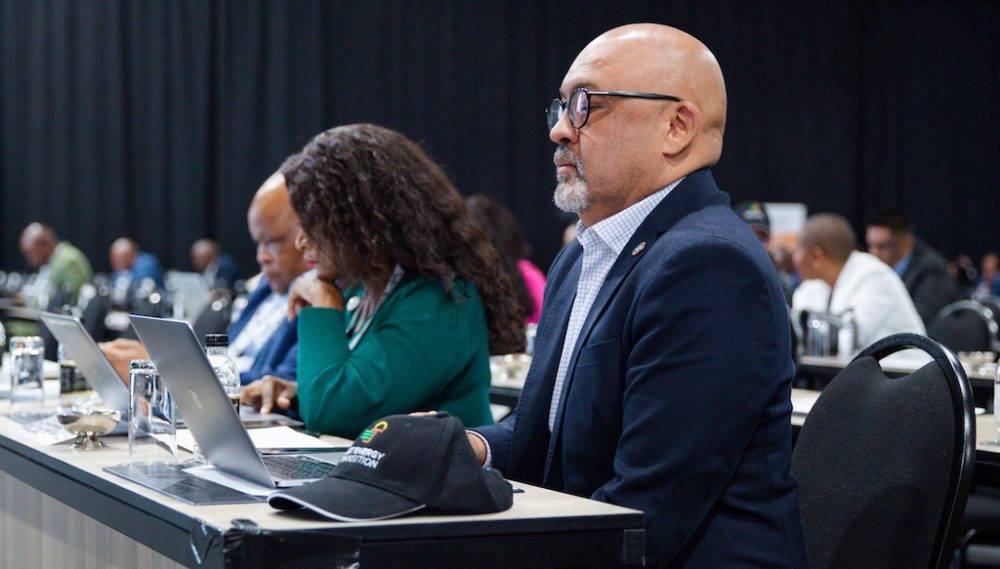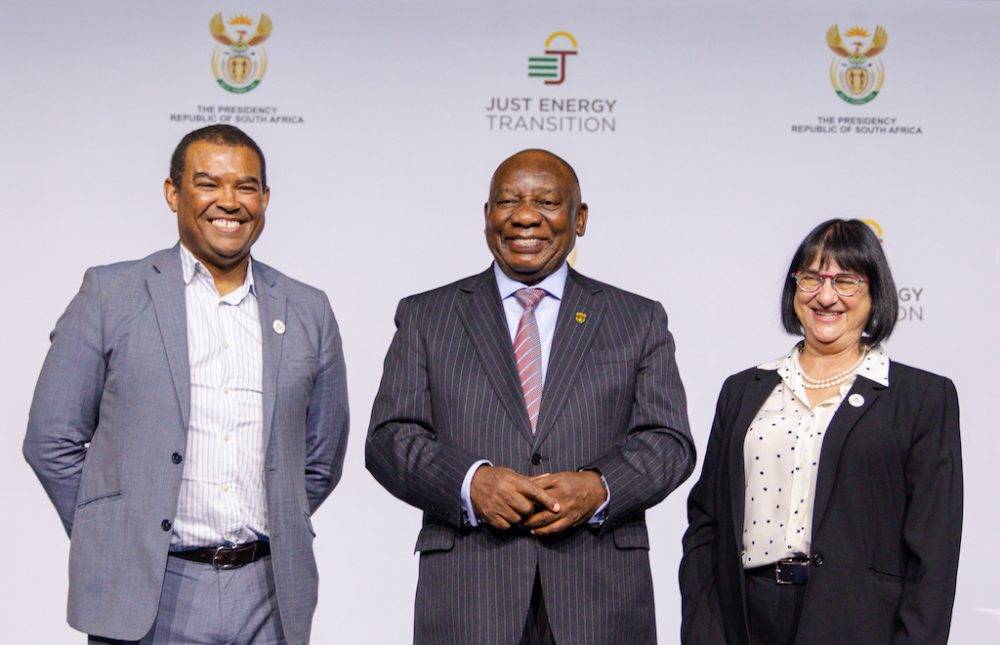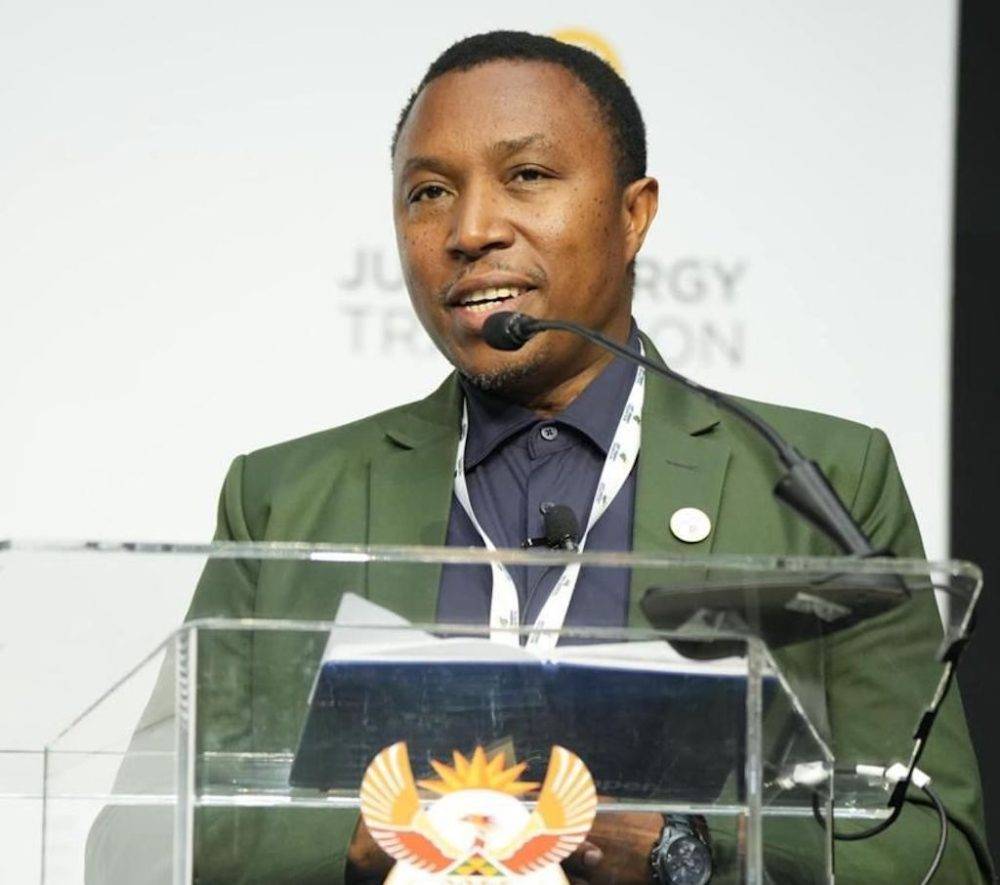Financing JET: National Treasury is the entity responsible for managing and disbursing the funds. Image supplied
The treasury said that out of the $11.6 billion pledged so far for the just energy transition (JET), $148 million in grant funding – or about 1.3% – has been allocated to Mpumalanga, with $825,000 directed to municipalities in the province.
Furthermore, $255 million of the $2.6 billion allocated under the Accelerating Coal Transition (ACT) programme — a new initiative that helps countries heavily reliant on coal shift towards cleaner energy sources –— is earmarked for community development and energy efficiency projects in the province. Mpumalanga is home to 12 out of 14 coal-fired power stations in South Africa.
Revenue management
While the main issue is how these municipalities will receive the funds, the treasury explained that efforts are being made to support municipalities in Mpumalanga through revenue management initiatives. “These include setting appropriate tariffs, reconciling the general valuation roll with the billing system, and developing best practices for credit control and debt management,” said the treasury, adding that these measures are intended to stabilise municipal finances and enable more active participation in JET projects.
The treasury said it has incorporated the JET process into the local government fiscal framework. “Treasury has expanded the scope of the Integrated National Electrification Programme conditional grants to support alternative energy solutions, including solar, micro-grids, wind, biomass, and energy storage systems.”
This is a significant development aimed at enabling municipalities, particularly in Mpumalanga, to tailor their energy strategies to local resources while addressing financial constraints, the treasury said.
In November 2023, Oxpeckers reported that financing for the JET is being undermined by indebted municipalities in Mpumalanga that are not bankable and are not in a position to attract financial investments to support their transition to renewable energy. (See Are municipalities good for JET money?)
The treasury said this week that it has updated the Municipal Borrowing Policy Framework to clarify financing mechanisms and encourage private-sector investment. The framework includes instruments such as green bonds, public-private partnerships and project financing. But the treasury acknowledged that challenges remain in creating bankable projects, with efforts under way to build the capacity of municipalities to access these funds.
The treasury is negotiating additional funding with international partners, including the African Development Bank and the Climate Investment Funds — Accelerating Coal Transition programme.
“These negotiations aim to secure funding for electricity distribution, water, and sanitation projects in Mpumalanga, as well as community-based projects to mitigate the socio-economic impacts of Eskom coal plant decommissioning,” the entity told Oxpeckers.
 Neil Cole: ‘We are considering what kind of credit guarantee vehicles can be put in place to support these local governments and weaker municipalities.’ Photo courtesy PMU
Neil Cole: ‘We are considering what kind of credit guarantee vehicles can be put in place to support these local governments and weaker municipalities.’ Photo courtesy PMU
Balancing sheets
Neil Cole, financing manager for the Presidency’s JET Implementation Plan project management unit (PMU), said the first challenge of financing municipalities with weak balancing sheets is that there is no mechanism for the treasury to borrow and then on-lend to municipalities.
“The treasury also does not provide sovereign guarantees to municipalities,” he said.
However, Cole said there is a review process under way to explore how municipalities that cannot borrow on their own balance sheets can receive this financing.
“We are considering what kind of credit guarantee vehicles can be put in place to support these local governments and weaker municipalities so that they can mobilise the financing they require. Additionally, we are examining how the conditional grant mechanism can be used in an innovative way to de-risk and leverage financing from the private sector.”
Although it is not clear how much Mpumalanga alone will need to facilitate the transition, Cole acknowledged the complexity of determining the exact financing needs for the province.
“It is not easy to say at this point how much Mpumalanga needs to facilitate the transition. The investment plan for Mpumalanga is roughly R65 billion. The transition involves a complex financing need that extends beyond the next five years, encompassing more than just electricity and gas components.
“When we did the costing of the South Africa transition investment plan, the total cost was $98 billion, or R1.5 trillion. We will allocate a significant portion of the $11.6 billion to Mpumalanga, but we will need to mobilise additional resources as well,” Cole added.
 Solution-finding: Joanne Yawitch (right) with President Cyril Ramaphosa and Rudi Dicks, head of the PMU (left), at the inaugural JET Municipal Conference. Photo courtesy PMU
Solution-finding: Joanne Yawitch (right) with President Cyril Ramaphosa and Rudi Dicks, head of the PMU (left), at the inaugural JET Municipal Conference. Photo courtesy PMU
Workstream setup
Joanne Yawitch, commissioner at the Presidential Climate Commission (PCC), noted that although money has flowed into the treasury, municipalities are heavily indebted, which impedes their ability to secure funds for the transition.
Speaking to Oxpeckers during the inaugural JET Municipal Conference, hosted by the PMU in partnership with the South African Local Government Association (Salga) in late August, Yawitch said the PCC is setting up a finance workstream that will address these issues and find solutions.
“Municipalities have balance sheets that limit their borrowing capacity, and mechanisms will need to be established to address this,” she said. “Additionally, many municipalities lack plans, which complicates the situation further. Having a plan is crucial because it provides a foundation for problem-solving.
“Our work will involve a lot of solution-finding to tackle these complex problems,” she said.
Yawitch explained the strategy is to start with the 20 municipalities responsible for 80% of distribution, which includes all major metros and several secondary cities. “By focusing on slightly larger municipalities, we can learn valuable lessons that might be applicable more broadly,” she said.
“However, significant work is required in capacity building, particularly in improving financial management, billing systems and debt collection. Our finance workstream will address how to access necessary funds, overcome existing problems and develop the plans municipalities need. This will involve collaboration with a capability workstream focused on enhancing municipal capacity and solving related issues.”
Yawitch expressed hope for progress by the end of the year, stating: “We aim to define the lead institution, establish workstreams and set terms of reference and action plans by the end of this year. We hope to hit the ground running in early 2025. Effective and efficient use of funds is crucial to support the energy transition.”
 Meaningful role: Moeketsi Mpotu at the Energy & Investment conference in Middelburg in July. Photo: Andiswa Matikinca
Meaningful role: Moeketsi Mpotu at the Energy & Investment conference in Middelburg in July. Photo: Andiswa Matikinca
Local consultation
At a recent business conference in Middelburg, Moeketsi Mpotu, chief executive of the Middelburg Chamber of Commerce and Industry, told Oxpeckers that local businesses are ready to play a meaningful role in the JET. However, he stressed the need for proper consultation and transparency.
“There are opportunities that local businesses can seize to support the multinationals that come here,” he said. “Our main issue is the lack of proper consultation and transparency about where the JET money is spent.”
Mpotu suggested that the JET office be located in Mpumalanga, or that the chamber have some oversight, particularly for Mpumalanga-related projects. “This would ensure transparency and allow us to track where the money is going,” he explained.
 Nhlanhla Ngidi: ‘The transition is not going to happen up in the air; it’s going to happen in local government’. Photo courtesy PMU
Nhlanhla Ngidi: ‘The transition is not going to happen up in the air; it’s going to happen in local government’. Photo courtesy PMU
Salga’s role
Oxpeckers also spoke to Nhlanhla Ngidi, head of energy and electricity distribution at Salga, about the organisation’s role in the new PCC just energy transition workstream. “We are advocating on behalf of municipalities, and we are also protecting their interests,” he said.
“The transition is not going to happen up in the air; it’s going to happen in local government, so we have to protect the interests of municipalities. As a result, our key role is that we sit in the PCC as Salga.”
Ngidi also stated his concerns regarding the balance sheets of municipalities. “Most municipalities’ balance sheets are not in good condition to secure funding from financial markets or institutions. Therefore, with the energy transition and available funding, we must approach this differently from traditional financing requirements.
“The government itself needs to stand behind municipalities and provide guarantees to secure funding. This could involve a combination of loans, grants and government support. Since COP26 we’ve seen various pledges, but to implement projects and start receiving funds, we must ensure everything is above board. We must avoid the maladministration of these funds.”
Ngidi said municipalities are working on preparatory manuals that package all necessary projects. “Municipalities will be able to request funds based on these plans and the projects they’ve identified for the JET,” he said.
“It is crucial for municipalities to package their projects and conduct feasibility studies to determine project needs and budget requirements. Without knowing the number and value of projects, providing funds would be ineffective.”
“Once preparation is complete, we will enter the practical implementation phase, which will involve extensive public participation and consultation. Each municipality must have community representatives on project steering committees to ensure local businesses and citizens are informed and involved. Everything must be communicated comprehensively to ensure no one is left behind,” Ngidi said.
Thabo Molelekwa is an associate journalist at Oxpeckers Investigative Environmental Journalism, and a graduate of our #PowerTracker professional support and training programme. This investigation was supported by the African Climate Foundation’s New Economy Hub.
Track the development of energy projects across Mpumalanga province on the Oxpeckers #PowerTracker tool